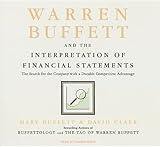Warren Buffett and the Interpretation of Financial Statements: The Search for the Company with a Durable Competitive Advantage
List Price: £20.49
Price: [wpramaprice asin=”1400140293″]
[wpramareviews asin=”1400140293″]
[wprebay kw=”warren+buffett” num=”0″ ebcat=”-1″]
Find More Warren Buffett Products




A Basic Primer with Conservative Advice,
This is a quick and easy-to-read book that details some of the arcana of what appears on a company’s financial statements. Those with experience in the field of investing probably know everything here, but they might still pick up something useful from the emphasis that is placed on certain numbers/ratios, things that supposedly Mr. Buffett uses to help find his next company to buy.
The advice provided by this emphasis should be very good to someone who is not interested in gambling, but rather is looking for good companies that will provide a better than average return over a long term (10+ years) investment. Following this advice will clearly lead you to some rather staid, unexciting companies (Coca-Cola, Wrigley’s), and will definitely steer you away from young, technically oriented companies. This is not necessarily a bad thing, but the usefulness of this approach depends on both what your investing goals are and how much capital you can invest for what period of time. However, being able to interpret just what those numbers mean on a financial statement is a good skill to have, regardless of your investing goals.
Unfortunately, the book is marred by multiple repetitions of certain very basic points, and some statements that are false to fact (“No one gets rich investing in companies that are losing money” – quite a few do quite well selling such a company short or buying put options). And although some advice is given on market timing – just when should you buy a company after you’ve identified it as a good long-term prospect – I found the advice inadequate, with not enough emphasis or detail on looking at economic conditions as a whole, market sentiment, current interest rates as a competitive investment vehicle vs your ‘pick’, etc. Also left hanging was how to identify an otherwise good company that has made a ‘solvable’ error and is not currently doing well – figuring out what a solvable error is is a matter of judgment and often requires expertise not just in the world of finance but in the specific product line that company is involved with.
Recommended for people who are relatively new to investing, especially young people who can seriously benefit from having a long-term view of investing, but it will provide little for more experienced investors.
—Reviewed by Patrick Shepherd (hyperpat)
Was this review helpful to you?

|A great introduction to reading financial statements,
Whether or not Warren Buffett does use the techniques laid out in this book only he will know. Nevertheless, this book is very concise and understandable in its walkthrough of company financial statements.
The book is split in to three parts: the income statement, the balance sheet and the cash flow statement. Each of the statements is analysed to determine the characteristics a company with a durable competitive advantage may have.
By far and away the most comprehensive analysis is given to the income statement. Various ratios are analysed for gross operating profit, expenses, interest expenses, R&D, depreciation and net income. Without going into too much detail, the underlying message in studying these ratios is consistency. Buffett apparently looks back over ten years worth of company statements in a bid to find consistent earnings. Iconic Buffett investments such as Coca-Cola, Gillette and American Express are cited regularly as examples of companys with durable competitive advantages who have consistent upward earnings.
The book is not so comprehensive in the balance sheet and cash flow analysis. However, obvious areas for analysis are highlighted and include long and short term debt, receivables, inventories and PPE. The authors do go into quite a bit of detail when it comes to analysing equity and retained earnings. I learnt quite a bit in this section with regards the treatment of preferred and treasury shares. The cash flow statement is briefly analysed in that apparently this is where Buffet determines the ability of a company to consistently generate cash – a sure sign of a durable competitive advantage.
The book concludes on how Buffett values a company through what apparently he terms an equity bond. This is pre-tax income divided by outstanding shares. He is effectively comparing the yield of bonds versus the yield in equity. Examples such as Washington Post and Coke are used to demonstrate how effective this ratio has been for him.
In summary, if someone wants a solid introduction to the analysis of company statements for investment purposes this book is a good start. While the book doesn’t provide the secret to successfully beating the market, it does provide a good insight into some of the basic fundamentals that high quality, well managed companies have.
Was this review helpful to you?

|Excellent Investment Primer,
I strongly recommend this book. Very simply written, it gives an excellent synopsis of what to look for in the financial statements of a quality company. I think this book would be read very well in conjunction with Philip Fisher’s classic ‘Common Stocks and Uncommon Profits’. Fisher laid out the theory which Buffett (Warren that is – not Mary) went on to master.
If I have a reservation, it would be that the template financial statements given in the back will lead you to companies that have had outstanding performance over the last 10 or 20 years. Almost invariably, they will have seen enormous share price outperformance. The tricky bit is to extrapolate whether that outperformance will continue into the future. This is the point that Fisher addresses in his book and is the ultimate holy grail of investing. How do I pick five companies for my portfolio that will go on to grow tenfold over the next 20 years?
There is simply no definitive answer to that question. It requires hard work, intelligence and some skill. Qualities Warren Buffet has in abundance. Still this book will point you on the right direction to that grail, so on that basis I give it 5 stars.
Was this review helpful to you?

|